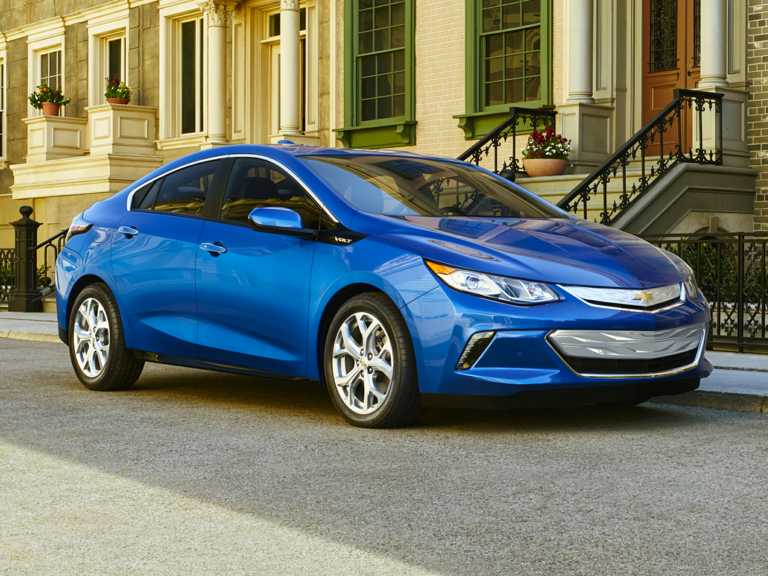Chevy Volt owners love their vehicles for many reasons, including their fuel economy and environmental benefits. Chevy Volt has been named the “Green Car of the Year” more than one time, and it was the 2012 European “Car of the Year” overall.
Chevrolet wants all of their cars to be safe, including the Volt, but over time, some safety issues can emerge. In the case of the Chevrolet Volt, GM has issued safety recalls throughout the electric/hybrid compact car’s history.
How many recalls does the Chevrolet Volt have?
Chevrolet has issued a total of seven recalls for Chevy Volts from model years ranging from 2010 to 2019. Some of these include:
- Problems with rear seat belts and safe child safety seat installation
- Rear brake caliper piston issues
- Loss of power in the hybrid propulsion system
- Automatic vehicle restarting while driver is absent

If you have a Chevrolet Volt, you can read more about safety recalls here. We’ve covered the details on Chevy Volt recalls for you here:
Rear Seat Belt Retractor May Not Lock / FMVSS208
NHTSA Recall ID: 18V673000
Everyone wants their child’s safety seat to be correctly installed. But problems with the seat belt retractor assemblies in some Chevy Volts and other GM models could cause issues with the locking mechanism. This makes it impossible to properly secure child seats.
If you have a Chevrolet Volt made between 2018 and 2019, your vehicle could be part of the recall. Chevy dealers will inspect your rear seat belt retractors. If necessary, they will replace them for free so that your child safety seat is secured.
Insufficient Coating on Rear Brake Caliper Pistons
NHTSA Recall ID: 18V576000
The ability to brake is one of the most important functions on any vehicle, and Volt is no exception. Along with other GM vehicles, some 2018 to 2019 Chevrolet Volts could have too little coating on their rear brake caliper pistons.
The risk of not responding to this recall notice for Chevrolet Volt is a loss of braking performance, which could potentially cause an accident.
Dealers will inspect your Chevrolet Volt’s brakes for free and bleed the brake system, ensuring that your brakes will function properly.
Improper Airbag Inflation
NHTSA Recall ID: 17V621000

In a crash, you want to rely on your car’s safety systems, including the airbags. In the case of a small number of Chevrolet Volts made between 2015 and 2016, the driver’s front airbag could deploy improperly in a high-speed crash.
If this defect in airbag deployment isn’t repaired, you could have an airbag failure in a crash, resulting in severe injuries.
Chevy dealers will replace the front driver’s airbag module for free if you are part of this recall.
Steering Gear Not Tightened to Specification
NHTSA Recall ID: 15V442000
If you’re driving and your tie rod separates from your steering gear, you run the risk of being unable to steer at all, with obvious crash risks. A small number of Chevrolet Volt models made between 2013 and 2015 could have this problem.
Chevy dealers will replace the steering gear assembly for the affected models at no charge to you.
Loss of Propulsion Power in Low Voltage Condition
NHTSA Recall ID: 18V397000
Driving along the highway in your Chevy Volt, the voltage drops, and you may lose propulsion. Without propulsion, you can come to an unexpected stop, resulting in an accident.
About 4,600 2013 Chevy Volts have been recalled because updates to their Hybrid Powertrain Control Module 2 (HPCM2) could disable the cell balancing function, which leads to low voltage.
At no charge, dealers will reprogram the HPCM2 to eliminate the problem and restore safe function of the affected vehicles.
Unattended Vehicles Left Running Could Cause CO Poisoning
NHTSA Recall ID: 15V145000
Carbon monoxide (CO) is a dangerous toxic gas, and if some vehicles are left running in enclosed spaces, like garages, the gas can build, leading to serious injury or even death.
About 50,000 Chevrolet Volts made between 2010 and 2013 could have this problem, which is related to a feature of the Volt’s electrical system.
If you own an affected Chevy Volt and leave the car without turning off its electrical system, the battery can drain to the point that the Volt’s gas engine will turn on by itself, leading to excess CO production.
Chevrolet dealers will update engine management software, which will limit the amount of time your Chevy Volt can be left with the electrical system on. This will prevent excessive vehicle battery drain and stop the gas engine from turning on.
Brakes May Lock Up / FMVSS 126, 135
NHTSA Recall ID: 13V271000
Vehicle anti-lock brake systems (ABS) rely on complex systems to work properly. In the case of a small number (4) of Chevrolet Volts made in 2012, a faulty brake pressure modulator valve could cause the ABS braking system to malfunction.
If you own one of the few Volts affected by this problem, your front brakes could lock and not release, leading to a crash risk.
Chevrolet dealers will install a new brake pressure modulator valve to restore safe brake operation.
How Should I Handle a Recall Notice for My Chevrolet Volt?
First, you can learn which, if any, recalls your Chevrolet Volt has by checking the NHTSA (National Highway Traffic Safety Administration) website. General Motors also offers a VIN check for recalls and service needs through its Recall Center.